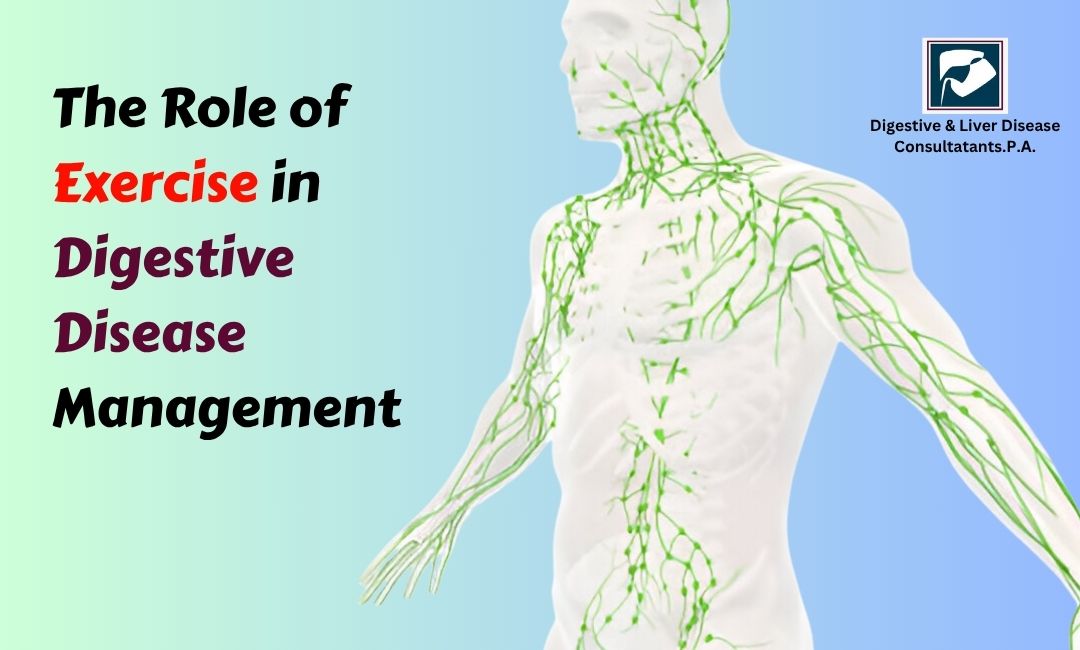When most people think about managing digestive issues, they usually think about diet, medications, or lifestyle changes. But one important part of digestive health that often gets overlooked is exercise. Physical activity doesn’t just help with weight loss or heart health—it plays a powerful role in supporting your digestive system, too.
At Digestive & Liver Disease Consultants, P.A., we help patients manage and treat a wide range of digestive and liver conditions. Along with medical treatments and dietary advice, we often encourage patients to include regular exercise in their daily routine. In this blog, we’ll explain how exercise can help improve digestion, reduce symptoms, and even prevent digestive diseases.
How Exercise Affects Your Digestive System
Exercise keeps your whole body active, including your digestive organs. Here’s how movement helps your gut work better:
1. Boosts Digestive Motility
Physical activity encourages the muscles in your digestive tract to contract more efficiently. This helps move food through your system faster and reduces the chances of constipation. A simple walk after meals can make a big difference in how comfortably your food digests.
2. Reduces Inflammation
Chronic inflammation is a key factor in many digestive conditions, including Crohn’s disease and ulcerative colitis. Studies show that moderate exercise can reduce inflammation in the body, helping to ease symptoms and protect your digestive organs.
3. Promotes Healthy Gut Bacteria
Your gut is home to trillions of bacteria that affect digestion, immunity, and overall health. Regular exercise has been linked to a more diverse and balanced gut microbiome, which is important for reducing symptoms like bloating, gas, and irregular bowel movements.
4. Supports Weight Management
Being overweight or obese increases the risk of many digestive issues, including acid reflux, gallstones, and fatty liver disease. Exercise helps burn calories and reduce abdominal fat, improving your metabolism and reducing pressure on the stomach and liver.
5. Lowers Stress and Anxiety
Stress can trigger digestive symptoms such as cramps, nausea, diarrhea, or constipation. Exercise is a natural stress reliever. Activities like walking, yoga, or swimming help calm the nervous system and can reduce stress-related gut symptoms, especially in people with irritable bowel syndrome (IBS).
Exercise and Specific Digestive Diseases
Let’s look at how physical activity can support people living with common digestive diseases:
• Irritable Bowel Syndrome (IBS)
Exercise can ease IBS symptoms by improving bowel function, reducing bloating, and calming the gut. Gentle aerobic exercises like walking, biking, and swimming are especially helpful.
• Gastroesophageal Reflux Disease (GERD)
Moderate exercise may help reduce symptoms by supporting weight loss and improving digestion. However, intense workouts (like heavy lifting or high-impact running) can sometimes worsen reflux, so it's important to choose the right type of activity and avoid exercising on a full stomach.
• Constipation
One of the most direct benefits of exercise is relief from constipation. Movement helps stimulate the intestines and promotes regular bowel movements. Even 20–30 minutes of daily walking can help.
• Fatty Liver Disease
Fatty liver disease, often linked to obesity and poor diet, can be improved through regular exercise. Both aerobic and resistance training help reduce liver fat and inflammation. Losing even a small amount of weight through exercise can significantly benefit liver health.
• Inflammatory Bowel Disease (Crohn’s and Ulcerative Colitis)
While high-intensity workouts may be too much during a flare-up, gentle exercise during remission can reduce stress and strengthen the body. Yoga and low-impact aerobics are often recommended for IBD patients.
How Much Exercise Do You Need?
The Centers for Disease Control and Prevention (CDC) recommends:
- At least 150 minutes of moderate-intensity aerobic activity per week (like brisk walking or cycling)
- Plus 2 days of muscle-strengthening activities (like lifting weights or using resistance bands)
If you're new to exercise, start small. Even a 10-minute walk after meals can help your digestion and improve your overall health. The key is consistency.
Best Exercises for Digestive Health
Not every form of exercise is ideal for digestion. Here are some of the best low- to moderate-intensity options to support gut health:
Walking: Improves bowel function and digestion.
Swimming: Gentle on joints and helps reduce inflammation.
Yoga: Reduces stress and stretches abdominal muscles to stimulate digestion.
Cycling: Aids circulation and promotes gut movement.
Tai Chi: Combines movement and breathing to improve mind-body balance.
Tips for Exercising with Digestive Conditions
Avoid working out right after eating: Wait at least 30–60 minutes after meals to exercise, especially if you’re prone to reflux or bloating.
Stay hydrated: Dehydration can worsen constipation. Drink plenty of water before, during, and after exercise.
Listen to your body: Some days, your symptoms may flare up. Choose low-impact exercises on those days and rest when needed.
Work with a healthcare provider: Before starting a new workout routine, especially if you have a chronic digestive condition, talk to your doctor.
About Digestive & Liver Disease Consultants, P.A.
At Digestive & Liver Disease Consultants, P.A., we specialize in diagnosing and treating a wide range of gastrointestinal and liver conditions. From common issues like acid reflux and constipation to complex liver diseases and inflammatory bowel disorders, our team provides personalized, patient-centered care.
We believe in a holistic approach to health, which includes not just medication, but also lifestyle guidance—like nutrition and exercise. Our team will work with you to develop a plan that supports your gut health and fits your life.
Conclusion
Exercise isn’t just for your heart or waistline—it’s an essential part of keeping your digestive system running smoothly. Whether you're managing a chronic condition or simply want to prevent future problems, physical activity can play a key role in your digestive wellness.
Exercise and gut health go hand in hand. Speak to our best gastroenterologists and nutritionists for a custom wellness plan today.






